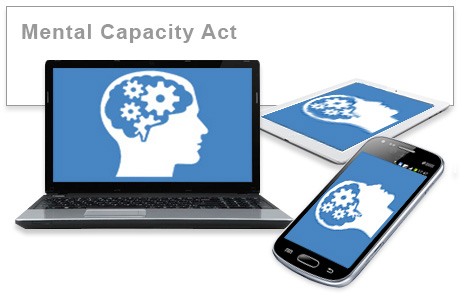mental-capacity-act-2005-f
Mental Capacity Act 2005 (F): e-learning training course

This comprehensive Mental Health Course comprises an introduction and six easy-to-follow study units. All the key aims and principles of this important legislation are covered, including the concepts of capacity and best interests, and the importance of the Code of Practice and how the courts become involved.
Unit Titles and Descriptions
Unit 1 - About The Course
Unit 2 - Introduction to the Mental Capacity Act
This unit looks at the background to the Mental Capacity Act and what it aims to achieve. It offers an overview of some of the key areas of interest to all staff whose work may be affected by the Act. The unit touches upon key areas which are dealt with in more detail in other units which make up this course. This unit will be of interest to anyone with no previous experience of the Mental Capacity Act, or anyone who requires a brief introduction to the act and its implications.
Unit 3 - Determining Capacity
This unit is about how mental capacity is assessed. It is crucial that learners have a thorough understanding of how capacity is determined. After completing this unit learners will be able to explain the assessment process used to measure mental capacity and will also be able to keep appropriate records in relation to assessing capacity.
Unit 4 - Making Decisions: Providing Care
This unit helps learners to understand exactly what is meant when we refer to a person’s ‘best interests’. After completing this Mental Health Course online, learners will be able to identify when they may need to act on behalf of a person who lacks the capacity to consent.
It will guide them through the process for establishing a person’s ‘best interests’ and will clarify the role of the decision maker in these situations.
Unit 5 - The Code of Practice
The Code of Practice plays an important role in the operation of the Mental Capacity Act. This unit helps learners understand why everyone involved in the care of people who may lack capacity to make decisions must consult the Code of Practice.
Unit 6 - The MCA in Practice
The Code of Practice is one measure introduced to support implementation of the Mental Capacity Act. There are others. This unit helps learners to understand some of the new powers and services being introduced by the MCA. The unit also introduces other organisations who can provide protection to people lacking the capacity to make decisions for themselves.
Unit 7 - Protection and Supervision
This unit assists learners to understand certain changes resulting from the Mental Capacity Act (MCA) and how these changes are initiatives for better protection and supervision of people who lack capacity. The unit concludes by exploring the MCA's provisions for children and young people.
Learning Objectives: at the end of the course, students will be able to:
- Describe the key aims and principles of the Mental Capacity Act 2005
- Explain the terms ‘best interest’ and ‘decision maker’
- Describe the implications of the Bournewood case
- Define the role of the Public Guardian
- Explain what is meant by the Lasting Powers of Attorney (LPA) and differentiate between
- LPAs and Enduring Powers of Attorney (EPAs)
- Define what is meant by lacking capacity
- Specify who can assess people for capacity
- Explain how to keep appropriate records in relation to assessing capacity
- Explain what the Code of Practice is and the reasons for its establishment
- Identify the role and duties of IMCAs
- Describe the powers of the Court of Protection and Court-appointed Deputies.
Mental Capacity Act Specialist Case Studies course also available.
Anyone interested in this mental health first aid course or any of our other mental health courses online can contact our highly professional and knowledgeable team who are always happy to help and provide leading information in association with all courses.
Copyright Notice | Terms and Conditions | Privacy Statement | Disclaimer |
Copyright © 2006 - 2024 Embrace Learning Ltd.